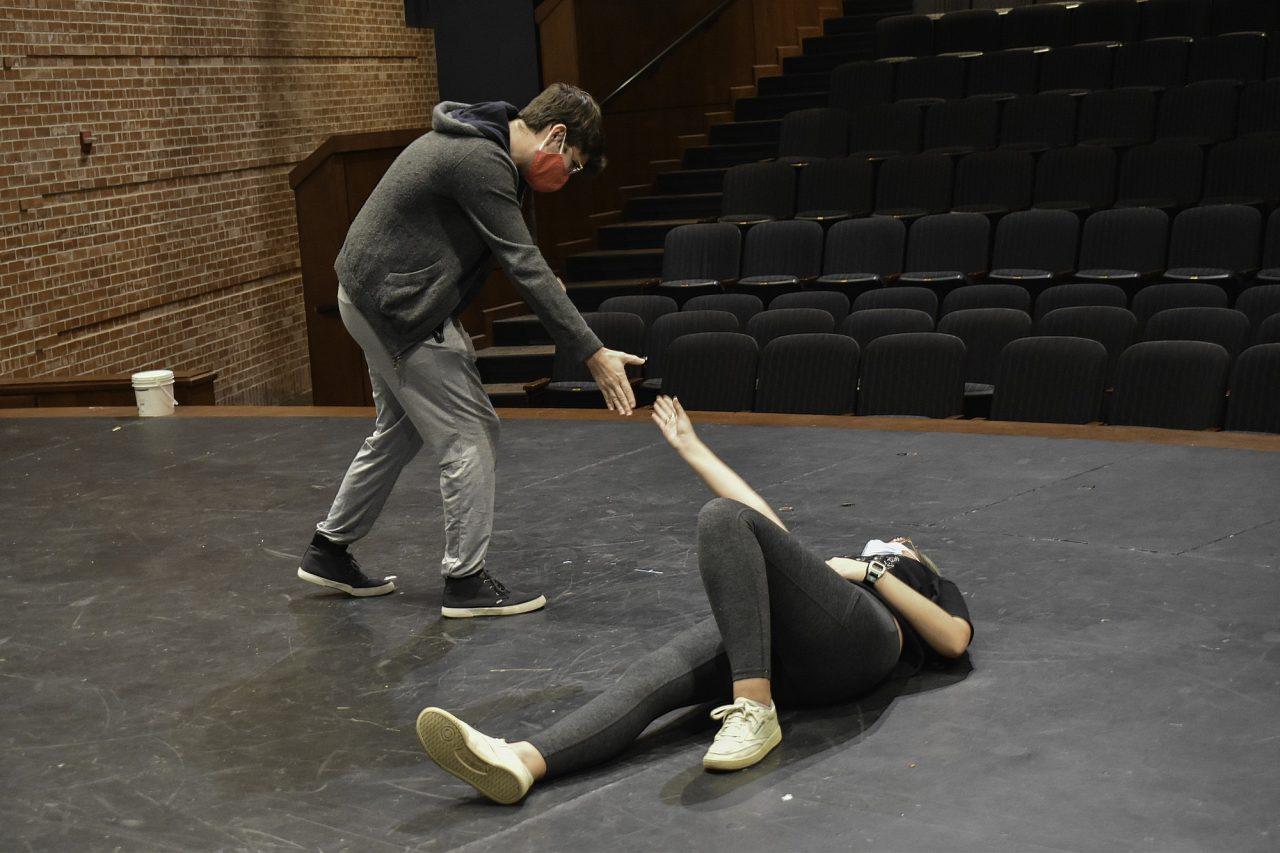photos by Claire Sammons
All classes at Trinity have had to undergo changes to adapt to the new safety requirements put in place due to COVID-19. For many, this resulted in switching to an online curriculum with remote lectures and digital assignments. For the classes that were still offered in person, safety measures such as social distancing and wearing face masks have been put in place, yet these solutions still present a variety of other problems when it comes to the arts, specifically to acting. How do you learn how to convey an emotion to an audience when half of your face is covered? How do you act along with a fellow student to create a compelling scene when you are required to remain six feet apart? Theatre professors Stacey Connelly and Nathan Stith have had to ask themselves these questions among many others to find a way to teach their Introduction to Acting courses, and they feel that they’ve come up with pretty good solutions.
“We made the decision that acting class doesn’t really work online,” Stith said. “And we are committed to covering the same things pedagogically that we always do but in a safe fashion face to face.”
Though they might have been committed early on to teaching the acting course in person and began to plan early on, many challenges only became apparent once the semester started. Little things like passing out papers or props became exercises in problem solving as the professors had to think of ways around such close interactions.
“One of the ways we’ve sort of taken care of issues having to do with warm-ups is by instead of doing a whole lot of theatre games where we’re doing a lot of touching, we do yoga on these mats that are sort of like [the students’] home base,” Connelly said. “It’s a lot more silent than it used to be.”
Despite the challenges of restructuring the class, this has given the professors the opportunity to focus on aspects of acting that they normally would not have had the chance to. One of the biggest changes has been acting with face masks, but students are now tasked with focusing more on their bodies and how their body language can convey a sense of who their character is to viewers.
“We will be spending a lot of time on, for the rest of the semester, how you can use your body to inform the character,” Stith said. “The way you hold yourself, the kind of tension you hold, we’ll focus on things like that which can all be very expressive and helpful in helping the audience understand what’s happening emotionally or psychologically for the character.”
The new focus on one’s body when acting is something that Connelly sees as a positive, especially as students are forced to sit in front of a computer for most of the day.
“I feel like it’s very easy in an academic setting, because of the intense emphasis on study and classroom work, to live in your head, and, most of the day, you forget you have a body attached to it,” Connelly said. “[Acting] helps you think about your body and, we often take it for granted, how incredibly skilled your body is.”
Students in the Introduction to Acting courses seem to have risen to the many new challenges and embraced the opportunity to adapt and try new things.
“We’ve had a couple activities where we’re supposed to just pantomime, but you can’t see our mouths or our expressions, so it’s been hard in that sense,” said Ifeyinwa Mbanefo, junior.
“Of course, the masks make it so much more difficult,” said Megan McGuire, sophomore. “But I think it will make us better actors in the long run because when you’re wearing a mask, you really have to try to have good dictation, and you have to enunciate so people can understand you.”
McGuire also expressed her joy of simply being able to attend a theatre class and have some semblance of normalcy in a time with so many changes. According to McGuire, her acting class has become something that she can look forward to throughout her week.
“I think the normalcy of walking into Ruth Taylor Theatre Building is just so nice,” McGuire said. “That building is so comforting and feels so much like home that it’s nice to just be back even if it is strange and modified.”
Stith and Connelly are looking forward to the rest of the semester and the future projects that the students create. They are thankful for the opportunity to connect with and provide a space for students through art, which seems to be more important now than ever as students have had to adjust to so many changes already.
“This is what we call sacrificing for our art, that old phrase that now we’re living,” Connelly said.







